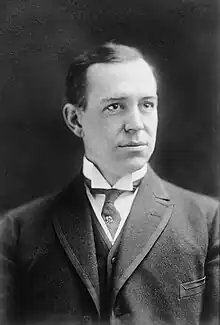Thomas Griffith Haight
Thomas Griffith Haight Sr. (August 4, 1879 – January 26, 1942) was a United States circuit judge of the United States Court of Appeals for the Third Circuit and previously was a United States district judge of the United States District Court for the District of New Jersey.
Thomas Griffith Haight Sr. | |
|---|---|
 Circa 1910-1915 | |
| Judge of the United States Court of Appeals for the Third Circuit | |
| In office April 1, 1919 – May 31, 1920 | |
| Appointed by | Woodrow Wilson |
| Preceded by | John Bayard McPherson |
| Succeeded by | John Warren Davis |
| Judge of the United States District Court for the District of New Jersey | |
| In office February 18, 1914 – April 1, 1919 | |
| Appointed by | Woodrow Wilson |
| Preceded by | Joseph Cross |
| Succeeded by | Charles Francis Lynch |
| Personal details | |
| Born | Thomas Griffith Haight August 4, 1879 Freehold Borough, New Jersey |
| Died | January 26, 1942 (aged 62) |
| Relations | Charles Haight (uncle) |
| Education | Princeton University New York Law School (LLB) |
Early life
Born on August 4, 1879, in Freehold Borough, New Jersey, Haight attended Princeton University and then received a Bachelor of Laws in 1900 from New York Law School.
Career
Early career
He entered private practice in Jersey City, New Jersey from 1901 to 1913. He was city attorney for Jersey City from 1911 to 1913. He was corporation counsel for Hudson County, New Jersey from 1913 to 1914.[1]
Federal judicial service
Haight was nominated by President Woodrow Wilson on February 3, 1914, to a seat on the United States District Court for the District of New Jersey vacated by Judge Joseph Cross. He was confirmed by the United States Senate on February 18, 1914, and received his commission the same day. His service terminated on April 1, 1919, due to his elevation to the Third Circuit.[1]
Haight received a recess appointment from President Wilson on April 1, 1919, to a seat on the United States Court of Appeals for the Third Circuit vacated by Judge John Bayard McPherson. He was nominated to the same position by President Wilson on May 23, 1919. He was confirmed by the Senate on June 24, 1919, and received his commission the same day. His service terminated on May 31, 1920, due to his resignation.[1]
Later career
Following his resignation from the federal bench, Haight returned to private practice in Jersey City from 1920 to 1942.
Personal life and death
Haight was the nephew of General Charles Haight.[2] He died on January 26, 1942.[1]
References
- Thomas Griffith Haight at the Biographical Directory of Federal Judges, a public domain publication of the Federal Judicial Center.
- Van Winkle, Daniel (1924). History of the Municipalities of Hudson County, New Jersey, 1630-1923. Vol. 2. p. 14.
Sources
- Thomas Griffith Haight at the Biographical Directory of Federal Judges, a public domain publication of the Federal Judicial Center.